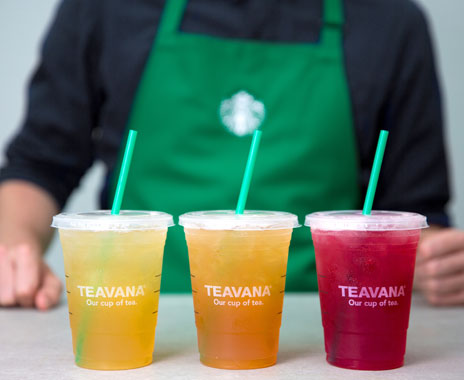Starbucks’ decision to shutter its entire Teavana footprint has hit a roadblock. On Monday, an Indiana federal judge ruled in favor of Simon Property Group, forcing Starbucks to keep 77 of its Teavana stores open and honor their leases. The Indianapolis-based mall operator, which is the country’s largest, sued the company back in the summer when Starbucks first revealed its intention to close all 379 Teavana locations.
The judge at Marion Country Superior Court last week granted a preliminary injunction to halt Starbucks from closing and conducting any going-out-of-business sales in those 77 locations. Only two of the leases are set to expire before the spring, with some going as far as 2027.
Simon Property Group sued on the basis that its Teavana stores weren’t actually losing money. It said Teavana was not growing fast enough to fit into Starbucks’ overall business goals, but was doing just fine on its own.
“Starbucks’ decision to close its Teavana stores is simply an effort to further increase its economic gains at the expense of others,” Simon said in the suit, filed by Indianapolis-based law firm Barnes & Thornburg LLP. “Starbucks does not contend that Simon breached any lease or that Starbucks cannot remain viable if it continues to honor its promises in its leases for stores in Simon’s shopping centers. Instead, Starbucks simply believes it can make more money if it violates the leases than if it honored its contractual promises and obligations.”
Simon Property said in the suit that Teavana’s fate shouldn’t be compared to that of some big-box retailers struggling to stay open. When it was announced, Starbucks’ 2012 acquisition of Teavana for $620 million was the largest in company history. And as recent as a year ago, the suit claims, Starbucks was touting success within its tea business.
The suit said many companies, such as Sears, Macy’s, and Sports Authority, have closed stores to avoid bankruptcy and “that staying open and fulfilling their leases would cause them financial ruin.”
“That obviously is not the case with Starbucks, which is one of the largest and most recognized companies in the world,” the suit said.
No word has come yet on whether Starbucks will file an appeal. “We are disappointed in the judge’s ruling and will continue to focus on finding a resolution,” Starbucks said in a statement, according to Fortune.
Starbucks said it plans to close the majority of its Teavana stores by spring 2018. This didn’t come as a surprise following the company’s earlier comments. Notably, Starbucks CEO and president Kevin Johnson admitted to investors during a conference call in April that Starbucks “launched a review process … to take clear action to improve the performance of our Teavana mall store portfolio.”
The stores struggled through the holiday season and performed even worse through the second quarter than Starbucks predicated, resulting in the java chain labeling them “at-risk Teavana mall stores.”
As a whole, Starbucks has fought to regain foot traffic in recent quarters. It said during the fourth that it has sold more than $1.6 billion of Teavana beverages in Starbucks stores in the past 12 months. The company has no plans to remove it from in-store shelves; it just wants to exit malls.
In fact, Starbucks announced in November that it was selling the iconic tea brand Tazo for $384 million to Unilever so it could focus solely on Teavana. This would include entering the packaged tea category in 2018. Starbucks said it expects its Teavana business to represent over $3 billion over the next five years.
Starbucks reported global comparable same-store sales growth of 2 percent in the fourth quarter, driven by a 2 percent increase in average ticket, and a 1 percent boost in transactions.












